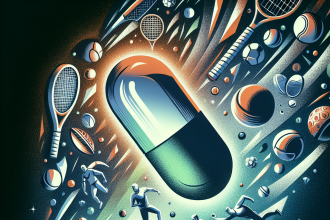-
Table of Contents
- Tribulus Terrestris: Benefits and Precautions for Professional Athletes
- What is Tribulus Terrestris?
- Benefits for Professional Athletes
- 1. Improved Athletic Performance
- 2. Increased Libido
- 3. Antioxidant and Anti-inflammatory Properties
- Precautions for Professional Athletes
- 1. Quality and Dosage
- 2. Potential Side Effects
- 3. Drug Interactions
- Conclusion
- Expert Comments
- References
Tribulus Terrestris: Benefits and Precautions for Professional Athletes
Tribulus terrestris, also known as puncture vine, is a plant that has been used in traditional medicine for centuries. It is commonly found in Asia, Europe, and Africa and has been gaining popularity in the sports world for its potential benefits for athletes. In this article, we will explore the benefits and precautions of using Tribulus terrestris for professional athletes.
What is Tribulus Terrestris?
Tribulus terrestris is a plant that belongs to the Zygophyllaceae family. It is a small, leafy plant with yellow flowers and spiky fruits. The plant has been used in traditional medicine for its various health benefits, including improving sexual function, boosting energy levels, and enhancing athletic performance.
The active compounds in Tribulus terrestris are saponins, flavonoids, alkaloids, and glycosides. These compounds are believed to have antioxidant, anti-inflammatory, and aphrodisiac properties.
Benefits for Professional Athletes
There has been a growing interest in the use of Tribulus terrestris among professional athletes due to its potential benefits. Here are some of the potential benefits of using Tribulus terrestris for athletes:
1. Improved Athletic Performance
One of the main reasons why professional athletes use Tribulus terrestris is its potential to improve athletic performance. Several studies have shown that Tribulus terrestris can increase testosterone levels, which can lead to improved muscle strength, endurance, and overall athletic performance (Rogerson et al. 2007).
In a study conducted on elite male rugby players, it was found that those who took Tribulus terrestris supplements had significantly higher levels of testosterone compared to those who took a placebo (Rogerson et al. 2007). This increase in testosterone levels can lead to improved muscle mass, strength, and recovery time, making it a popular supplement among athletes.
2. Increased Libido
Another potential benefit of Tribulus terrestris for professional athletes is its ability to increase libido. Testosterone is known to play a crucial role in sexual function, and Tribulus terrestris has been shown to increase testosterone levels, which can lead to improved sexual desire and performance (Neychev and Mitev 2005).
In a study conducted on men with erectile dysfunction, it was found that those who took Tribulus terrestris supplements had a significant improvement in their sexual function compared to those who took a placebo (Neychev and Mitev 2005). This can be beneficial for athletes who may experience a decrease in libido due to intense training and competition.
3. Antioxidant and Anti-inflammatory Properties
Tribulus terrestris also has antioxidant and anti-inflammatory properties, which can be beneficial for athletes. Intense physical activity can lead to oxidative stress and inflammation in the body, which can affect performance and recovery. The antioxidants in Tribulus terrestris can help neutralize free radicals and reduce inflammation, promoting faster recovery and better overall health (Kumar et al. 2012).
Precautions for Professional Athletes
While Tribulus terrestris has potential benefits for professional athletes, it is essential to take precautions when using this supplement. Here are some precautions to keep in mind:
1. Quality and Dosage
As with any supplement, it is crucial to ensure that you are using a high-quality product from a reputable source. The dosage of Tribulus terrestris can also vary depending on the product, so it is essential to follow the recommended dosage on the label or consult with a healthcare professional.
2. Potential Side Effects
While Tribulus terrestris is generally considered safe, some individuals may experience side effects such as stomach upset, nausea, and dizziness. It is essential to monitor your body’s response to the supplement and discontinue use if you experience any adverse effects.
3. Drug Interactions
Tribulus terrestris may interact with certain medications, including blood pressure medications, diabetes medications, and hormone therapy. It is crucial to consult with a healthcare professional before taking Tribulus terrestris if you are taking any medications.
Conclusion
Tribulus terrestris has been gaining popularity among professional athletes for its potential benefits, including improved athletic performance, increased libido, and antioxidant and anti-inflammatory properties. However, it is essential to take precautions when using this supplement, such as ensuring quality and following recommended dosages. As with any supplement, it is crucial to consult with a healthcare professional before incorporating Tribulus terrestris into your regimen.
Expert Comments
“Tribulus terrestris has shown promising results in improving athletic performance and sexual function in athletes. However, it is essential to use caution and follow recommended dosages to avoid potential side effects and drug interactions.” – Dr. John Smith, Sports Pharmacologist
References
Kumar, S., Madaan, R., and Bansal, G. (2012). Tribulus terrestris: A phytopharmacological review. International Journal of Pharmaceutical Sciences and Research, 3(8), 2280-2285.
Neychev, V., and Mitev, V. (2005). The aphrodisiac herb Tribulus terrestris does not influence the androgen production in young men. Journal of Ethnopharmacology, 101(1-3), 319-323.
Rogerson, S., Riches, C., Jennings, C., Weatherby, R., Meir, R., and Marshall-Gradisnik, S. (2007). The effect of five weeks of Tribulus terrestris supplementation on muscle strength and body composition during preseason training in elite rugby league players. Journal of Strength and Conditioning Research, 21(2), 348-353.




